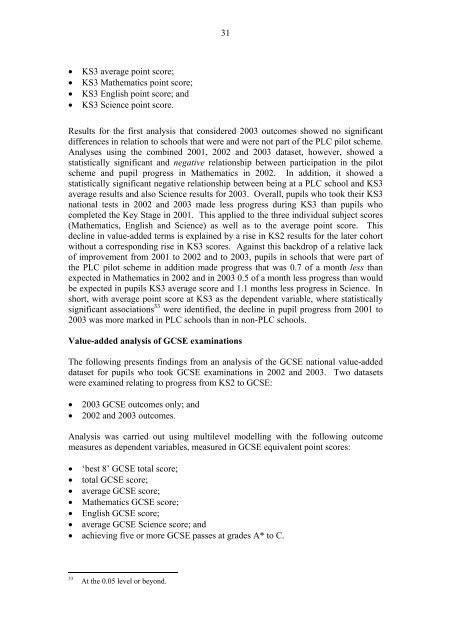Final Report of the Evaluation of the Pupil Learning Credits Pilot ...
Final Report of the Evaluation of the Pupil Learning Credits Pilot ...
Final Report of the Evaluation of the Pupil Learning Credits Pilot ...
Create successful ePaper yourself
Turn your PDF publications into a flip-book with our unique Google optimized e-Paper software.
31<br />
• KS3 average point score;<br />
• KS3 Ma<strong>the</strong>matics point score;<br />
• KS3 English point score; and<br />
• KS3 Science point score.<br />
Results for <strong>the</strong> first analysis that considered 2003 outcomes showed no significant<br />
differences in relation to schools that were and were not part <strong>of</strong> <strong>the</strong> PLC pilot scheme.<br />
Analyses using <strong>the</strong> combined 2001, 2002 and 2003 dataset, however, showed a<br />
statistically significant and negative relationship between participation in <strong>the</strong> pilot<br />
scheme and pupil progress in Ma<strong>the</strong>matics in 2002. In addition, it showed a<br />
statistically significant negative relationship between being at a PLC school and KS3<br />
average results and also Science results for 2003. Overall, pupils who took <strong>the</strong>ir KS3<br />
national tests in 2002 and 2003 made less progress during KS3 than pupils who<br />
completed <strong>the</strong> Key Stage in 2001. This applied to <strong>the</strong> three individual subject scores<br />
(Ma<strong>the</strong>matics, English and Science) as well as to <strong>the</strong> average point score. This<br />
decline in value-added terms is explained by a rise in KS2 results for <strong>the</strong> later cohort<br />
without a corresponding rise in KS3 scores. Against this backdrop <strong>of</strong> a relative lack<br />
<strong>of</strong> improvement from 2001 to 2002 and to 2003, pupils in schools that were part <strong>of</strong><br />
<strong>the</strong> PLC pilot scheme in addition made progress that was 0.7 <strong>of</strong> a month less than<br />
expected in Ma<strong>the</strong>matics in 2002 and in 2003 0.5 <strong>of</strong> a month less progress than would<br />
be expected in pupils KS3 average score and 1.1 months less progress in Science. In<br />
short, with average point score at KS3 as <strong>the</strong> dependent variable, where statistically<br />
significant associations 33 were identified, <strong>the</strong> decline in pupil progress from 2001 to<br />
2003 was more marked in PLC schools than in non-PLC schools.<br />
Value-added analysis <strong>of</strong> GCSE examinations<br />
The following presents findings from an analysis <strong>of</strong> <strong>the</strong> GCSE national value-added<br />
dataset for pupils who took GCSE examinations in 2002 and 2003. Two datasets<br />
were examined relating to progress from KS2 to GCSE:<br />
• 2003 GCSE outcomes only; and<br />
• 2002 and 2003 outcomes.<br />
Analysis was carried out using multilevel modelling with <strong>the</strong> following outcome<br />
measures as dependent variables, measured in GCSE equivalent point scores:<br />
• ‘best 8’ GCSE total score;<br />
• total GCSE score;<br />
• average GCSE score;<br />
• Ma<strong>the</strong>matics GCSE score;<br />
• English GCSE score;<br />
• average GCSE Science score; and<br />
• achieving five or more GCSE passes at grades A* to C.<br />
33<br />
At <strong>the</strong> 0.05 level or beyond.

















